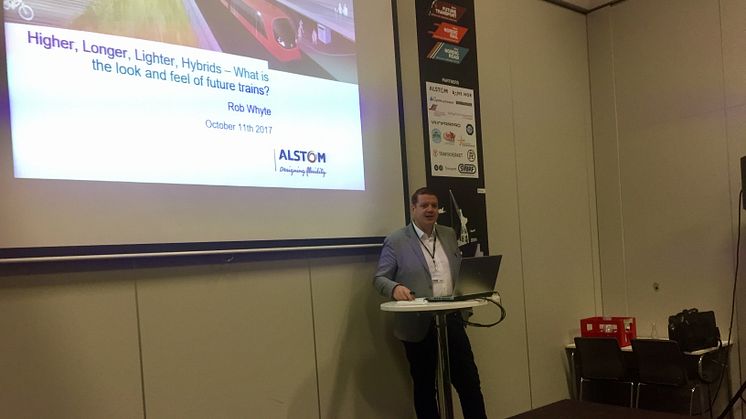
News -
Greener hydrogen can replace diesel
Hydrogen trains or battery-powered ones? Both options can replace diesel trains in the future. But why is a change necessary? These issues were discussed during the seminar “Higher, longer, lighter hybrids – What is the look and feel of the future trains?”
Even though trains are already an environmentally friendly way of travelling, challenges still remain. A number of lines in Europe are not yet electrified, and in Germany, for example, there are no long-term plans to do so.
There is therefore great pressure on the industry to develop greener solutions. The relevant technology already exists today. Both Alstom and Bombardier have trains with similar capacity as diesel trains but with fuel that is far more environmentally sound.
Whereas Bombardier chose to focus on battery-powered trains, Alstom decided to invest in hydrogen trains.
Rob Whyte is Managing Director of Alstom in the Nordic region and he points to Sweden and Norway as examples. In both countries most of the rail traffic is in the south of the country with far less in the north.
“Are you really going to spend some one to two million euros per kilometre to electrify a 100-kilometre stretch of track when it’s used by one train a day?” he asks. “Then you have to ask yourself if that is well-spent money compared with a hydrogen-powered solution. What people want to see is a solution that is self-propelled and carbon dioxide free – and that’s why we’ve developed hydrogen trains.”
The guiding principle for Alstom in developing a hydrogen-powered train has been simplicity. The company has taken an ordinary diesel train, removed the diesel engine, and instead placed hydrogen cells and hydrogen tanks on the roof. The train has a range of 800 kilometres, which can be extended depending on what type of hydrogen tank is used.
“In this way the train has the same characteristics as the old diesel-powered train – it has the same acceleration and braking in the curves, and the same space for passengers but with the advantages that now it is an electric train – that’s how it gets the power supply from the cells – it is now quiet and doesn’t rumble the way a diesel train can do. It is also totally carbon dioxide free. What comes out of the fuel cells is water and steam,” Whyte says.
The challenge is to find a good distribution network for the hydrogen. In Germany hydrogen is usually produced as a by-product of the chemical industry, and Alstom believes the production will differ depending on the region.
“If we look at Norway with its cheap energy consumption, where electricity is basically free during the night time, we can produce hydrogen by electrolysis. After you’ve invested in the infrastructure you’ve gained a complete solution,” Whyte concludes.
